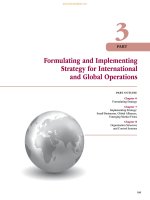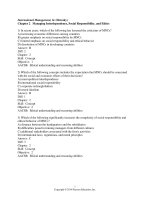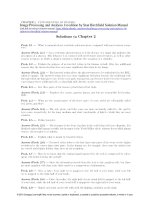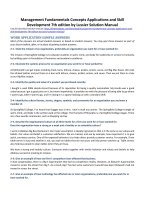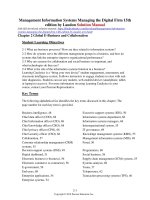International management managing across borders and cultures text and cases 9th edition by deresky solution manual
Bạn đang xem bản rút gọn của tài liệu. Xem và tải ngay bản đầy đủ của tài liệu tại đây (9.46 MB, 94 trang )
International Management: Managing Across Borders and Cultures,
Text and Cases 9th edition by Helen Deresky Solution Manual
Link full download solution manual: />Link full download test bank: />9ed Comprehensive Case #2: An Ethics Role Playing Case. Handouts to accompany Teaching Note. See
end of accompanying TN for instructions and sequence. NOTE: FOR EACH HANDOUT, print out a
separate sheet.
NOTE: Handout 1-Introduction and Background, and Handout 2-Decision 1 are in the textbook,
along with instructions to students.
Students should receive the appropriate version of Handout III based on their previous decision, as
indicated in each version on the following pages.
Handout III (Version 1)—Result of Decision 1 and New Decision 2
Your Decision 1 was (a) Continue operations and try to cut costs within six months.
Your days are extremely busy as you try to find appropriate ways to cut costs. Wages of all employees,
including yourself, have been halved, no one is happy, and morale is very low, but most people seem
to understand you are doing the best you can in a bad situation. Many of your extended family are
upset and have been asking your spouse to influence you to do more to help them. Your relationships
with government officials have also cooled dramatically. You are not yet sure why. Supply costs have
been reduced, at least for a time, and the sale price on Asian shoes has been increased, but this has led
to declining sales growth. As you feared, the results are still not good enough to meet the USHF’s profit
requirements, and you have quietly been asking local interests if they would be willing to buy out
AHF’s operations.
About three months into your trial period, a local government official, Abuwahr Sahib, approaches you
and offers to buy the company. You realize that there is a great deal of uncertainty about the future
cash flows the company will produce—can the company can restore its profitability to its former levels,
or are the current cash flow levels permanent? The value assigned to the firm is very sensitive to
whether optimistic or pessimistic assumptions about the future are used. Nevertheless, Sahib’s offer
price is at least 10% to 15% less than your estimate of the firm’s value. You don’t know Sahib personally,
but he has many highly placed government connections. All Sahib asks is that you recommend the sale
be approved by the parent USHF. In exchange, Sahib agrees to keep AHF running and to continue to
employ you as manager at your original salary. USHF will likely share your view that the offer price is
discounted, but the company is eager to complete a sale, and you are pretty sure you can convince the
home office to agree to the deal. Sahib made it plain that he will not up his offer, and that he can
guarantee that his would be the only offer looked upon favorably by the government. What do you do?
Decision 2
Part A: Does this decision involve ethics or is it a business decision? Please explain.
Part B: The decision is up to you. What do you do? Please circle (c) or (d1).
(c) Recommend that the company sell to Sahib
(d1) Don’t sell. Keep going as planned, cutting costs.
Please tell why you made the decision you did.
Handout III (Version 2)—Result of Decision 1 and New Decision 2
Your Decision 1 was (b) shut down.
Upon your return you announce that AHF will be closing sometime in the next three to nine months. You
indicate that you will try to keep as many people employed as long as possible, but you are not sure how
long that will be. You begin to look for buyers of specific assets or of the company as a whole. You
desperately hope that a local buyer may be found, but you know that is unlikely. No one is happy, least
of all you and your spouse, and morale is at an all-time low. Many of your extended family are
particularly upset and have been asking your spouse to influence you to do more to help them. Your
relationships with government officials have also cooled dramatically. You are not yet sure why.
About three months into your trial period, a local government official, Abuwahr Sahib, approaches you
and offers to buy the company. You realize that there is a great deal of uncertainty about the future
cash flows the company will produce—can the company restore its profitability to its former levels, or
are the current cash flow levels permanent? The value assigned to the firm is very sensitive to whether
optimistic or pessimistic assumptions about the future are used. Nevertheless, Sahib’s offer price is at
least 10% to 15% less than your estimate of the firm’s value. You don’t know Sahib personally, but he
has many highly-placed government connections. All Sahib asks is that you recommend the sale be
approved by the parent USHF. In exchange, Sahib agrees to keep AHF running and to continue to employ
you as manager at your original salary. USHF will likely share your view that the offer price is discounted,
but the company is eager to complete a sale, and you are pretty sure you can convince the home office
to agree to the deal. Sahib made it plain that he will not up his offer, and that he can guarantee that his
would be the only offer looked upon favorably by the government. What do you do?
Decision 2
Part A: Does this decision involve ethics or is it a business decision? Please explain.
Part B: The decision is up to you. What do you do? Please circle (c) or (d2).
(c) Recommend that the company sell to Sahib. (d2)
Don’t sell. Keep going with planned shutdown.
Please tell why you made the decision you did.
Students should receive the appropriate version of Handout IV based on their previous decision,
as indicated in each version on the following pages.
Handout IV (Version 1)—Result of Decision 2 and New Decision 3
Your Decision 2 was (c) recommend that the company sell.
USHF agrees and the deal is consummated. You stay on as manager of the new company, Sahib Shoes,
but you now handle the business end, trying to learn finance and foreign exchange management, while
Sahib has appointed his own man to run the day-to-day operations. Soon you learn through your family
connections that Sahib has begun using both child and prison labor and finding excuses to fire the
original workers. None of your family has been fired, though. Outraged, you go to Sahib and threaten to
quit and go to the government. Sahib calmly retorts that if you do either, he will fire all your family and
ensure that none of them will be able to find other employment. Also he reminds you of your
assistance in their deal with USHF and threatens to make your role public. What do you do? Do you
quit?
Decision 3
Part A: Does this decision involve ethics or is it a business decision? Please explain.
Part B: The decision is up to you. What do you do? Please circle either (e) or (f).
(e) Quit and go to the government.
(f) Protect your family by continuing to work.
Please tell why you made the decision you did.
Handout IV (Version 2)—Result of Decision 2 and new Decision 3
Your Decision 2 was (d1) Don’t sell. Keep going as planned, cutting costs.
You suddenly find your firm faced with supply problems, additional taxes on transactions, and surprise
government inspections that disrupt work. Sadly, you realize that trying to continue operations isn’t
going to work, and you notify the Seattle office that you are agreeing to shut down AHF as soon as
possible and you will concentrate on finding buyers for the firm’s assets. Landon is not surprised, and he
tells you not to worry because they have found a buyer, some local named something-or-other “Sahib”.
Sahib is willing to do a deal where he would make a large down payment today, sufficient to meet
USHF’s immediate cash flow needs, and make another large payment in one year if USHF will provide
low cost supplies for the first year, and if Sahib can retain you as a paid consultant to teach him how to
run the business. You will also get the opportunity to learn foreign exchange management and the
other aspects of business management you have never had the time to learn. When you express your
concerns about Sahib, and mention what Sahib tried to do, Landon is pleased that you didn’t cheat
USHF, but he lets you know that this is a done deal and you are expected to cooperate.
You stay on as a manager in the new company, Sahib Shoes, but your job now is to train Sahib and try to
learn finance, marketing, and foreign exchange management, while Sahib has appointed his own man
to run the day-to-day operations. Soon you learn through your family connections that Sahib has begun
using both child and prison labor and finding excuses to fire the original workers. None of your family
has been fired, though. Should you go to Sahib and threaten to quit and go to the government? If you
do, you know that he will fire all your family and ensure that none of them will be able to find other
employment. What do you do? Do you quit?
Decision 3
Part A: Does this decision involve ethics or is it a business decision? Please explain.
Part B: The decision is up to you. What do you do? Please circle either (e) or (f).
(e) Quit and go to the government.
(f) Protect your family by continuing to work.
Please tell why you made the decision you did.
Handout IV (Version 3)—Result of Decision 2 and New Decision 3
Your Decision 2 was (d2) Keep going with planned shutdown.
Landon calls and tells you that they have found a buyer, some local named something-or-other “Sahib”.
Sahib is willing to do a deal where he would make a large down payment today, sufficient to meet
USHF’s immediate cash flow needs, and make another large payment in one year if USHF will provide
low cost supplies for the first year, and if Sahib can retain you as a paid consultant to teach him how to
run the business. You will also get the opportunity to learn foreign exchange management and the
other aspects of business management you have never had the time to learn. When you express your
concerns about Sahib, and mention what Sahib tried to do, Landon is pleased that you didn’t cheat
USHF, but he lets you know that this is a done deal and you are expected to cooperate.
You stay on as a manager in the new company, Sahib Shoes, but your job now is to train Sahib and try to
learn finance, marketing, and foreign exchange management, while Sahib has appointed his own man
to run the day-to-day operations. Soon you learn through your family connections that Sahib has begun
using both child and prison labor and finding excuses to fire the original workers. None of your family
has been fired, though. Should you go to Sahib and threaten to quit and go to the government? If you
do, you know that he will fire all your family and ensure that none of them will be able to find other
employment. What do you do? Do you quit?
Decision 3
Part A: Does this decision involve ethics or is it a business decision? Please explain.
Part B: The decision is up to you. What do you do? Please circle (e) or (f).
(e) Quit and go to the government.
(f) Protect your family by continuing to work.
Please tell why you made the decision you did.
Students should receive the appropriate version of Handout V based on their previous three
choices, as indicated in each version.
Handout V (Version 1)—Final Results
Decision 1: (a) Continue operations and try to cut costs within six months. Decision 2: (c) Recommend
that the company sell to Sahib. Decision 3: (e) Quit and go to the government.
As a result of your actions, an investigation into Sahib’s affairs is begun, but it progresses slowly, and no
action is taken by the government. One by one, your family members are fired from the company, and
they have tremendous difficulty in finding other employment. You and your spouse have lost face in
their eyes, and you and your spouse and children have been ostracized. Your role in the sale of the
business to Sahib at a cut-rate price is public knowledge, and you cannot find work, either. None of your
old contacts will have anything to do with you. You receive an angry phone call from Landon, who wants
to know how you could have betrayed your employers and him. Having no one else to turn to, you have
no choice but to leave Sri Lanka in disgrace. Your spouse refuses to accompany you. You will try to start
over elsewhere, alone. Eventually, Sahib is forced out of the company by the government. A
government-backed consortium of local buyers takes over the company, and labor conditions slowly
improve.
Handout V (Version 2)—Final Results
Decision 1: (a) Continue operations and try to cut costs within six months. Decision 2: (c) Recommend
the company sell to Sahib. Decision 3: (f) Protect your family by continuing to work.
An investigation into Sahib’s affairs is begun, but it progresses slowly, and no action is taken by the
government until U.S. pressure eventually forces the authorities to act. Suddenly, without warning, you
and Sahib are arrested for human rights violations. After a quick trial, you and Sahib are both sentenced
to 10 years hard labor in a Sri Lankan prison. Sahib is freed after two years when his family manages to
bribe a high-ranking justice official. You try to involve U.S. officials in your case, but no one is particularly
interested in helping you because your role in the sale of the business to Sahib at a cut-rate price was
made public knowledge at the trial. Landon in particular made it plain that he will have nothing more to
do with you. A government-backed consortium of local buyers takes over the company and labor
conditions slowly improve. Eventually you are freed, but your career is over.
Handout V (Version 3)—Final Results
Decision 1: (a) Continue operations and try to cut costs within six months. Decision 2: (d1), (d2) Keep
going as planned and refuse to sell the company to Sahib. Decision 3: (e) Quit and go to the government.
A consortium of buyers headed up by Sook Whang, an old Asia hand and longtime friend of George
Landon, approaches you about purchasing AHF. Whang indicates their desire to purchase the company
and keep it running in Sri Lanka. Although you would not be the new company’s manager, they wish to
retain your services as a consultant, utilizing your business experience and extensive contacts. He states
that he hopes he can look forward to working with you for a long time to come. Whang indicates his
willingness to negotiate a fair price for the firm, as he recognizes the many benefits AHF, and you, have
brought to his country. Whang asks you to go ahead and resign from AHF so that you will have no
conflict of interest, and states that he will negotiate the details of the deal with Mr. Landon. Whang goes
on to say that he knows that Sahib and others have been troubling your efforts to manage AHF, and with
a quiet smile Whang indicates that Sahib “will no longer be a problem”. You agree and send a
resignation letter to USHF, including your estimate of the fair value of the company. Landon is pleased
with the news, though not surprised, because he is the one who first contacted Whang about the
opportunity, and the deal is quickly and easily done. USHF receives enough cash to satisfy its
stockholders with a small extra dividend and enough money to begin its next phase of technological
improvements. Without the high profit goals imposed by USHF, wages and employment levels return to
normal levels fairly quickly, and your status with your family has increased quite a bit.
Handout V (Version 4)—Final Results
Decision 1: (a) Continue operations and try to cut costs within six months. Decision 2: (b1), (b2) Keep
going as planned and refuse to sell the company to Sahib. Decision 3: (f) Protect your family by
continuing to work.
An investigation into Sahib’s affairs is eventually begun as increasing pressure instigated by U.S. and
U.N. human rights groups forces the authorities to act. Suddenly, without warning, you and Sahib are
arrested for human rights violations. After a quick trial, you and Sahib are both sentenced to ten years
hard labor in a Sri Lankan prison. A government-backed consortium of local buyers takes over the
company, and labor conditions slowly improve. Sahib is freed after two years when his family manages
to bribe a high-ranking justice official. Eventually U.S. officials become involved in your case, and you are
freed after three years. Because of your refusal to sell to Sahib at cut-rate prices, Landon has pressured
the U.S. to help you. He offers you a minor position with USHF back in the U.S., and having few
alternatives, you take it.
Handout V (Version 5)—Final Results
Decision 1: (b) Shut down. Decision 2: (c) Recommend that the company sell to Sahib. Decision 3: (e)
Quit and go to the government.
As a result of your actions, an investigation into Sahib’s affairs is begun, but it progresses slowly, and no
action is taken by the government. One by one your family members are fired from the company and they
have tremendous difficulty in finding other employment. You and your spouse have lost face in their eyes,
and you and your spouse and children have been ostracized. Your role in the sale of the business to Sahib at
a cut rate price is public knowledge and you cannot find work either. All your old contacts will have nothing
to do with you. You receive an angry phone call from Landon wanting to know how you could have betrayed
your employers and him. Having no one else to turn to, you have no choice but to leave Sri Lanka in disgrace.
Your spouse refuses to accompany you. You will try to start over elsewhere, alone. Eventually Sahib is forced
out of the company by the government. A government backed consortium of local buyers takes over the
company and labor conditions slowly improve.
Handout V (Version 6)—Final Results
Decision 1: (b) Shut down. Decision 2: (c) Recommend that the company sell to Sahib. Decision 3: (f)
Protect your family by continuing to work.
An investigation into Sahib’s affairs is begun, but it progresses slowly, and no action is taken by the
government until U.S. pressure eventually forces the authorities to act. Suddenly, without warning, you
and Sahib are arrested for human rights violations. After a quick trial, you and Sahib are both sentenced
to ten years hard labor in a Sri Lankan prison. Sahib is freed after two years when his family manages to
bribe a high-ranking justice official. You try to involve U.S. officials in your case, but no one is particularly
interested in helping you because your role in the sale of the business to Sahib at a cut-rate price was
made public knowledge at the trial. Landon, in particular, made it plain that he will have nothing more
to do with you. A government-backed consortium of local buyers takes over the company and labor
conditions slowly improve. Eventually you are freed, but your career is over.
Handout V (Version 7)—Final Results
Decision 1: (b) Shut down. Decision 2: (d1), (d2) Keep going as planned and refuse to sell the company to
Sahib. Decision 3: (e) Quit and go to the government.
A consortium of buyers headed up by Sook Whang, an old Asia hand and longtime friend of George
Landon, approaches you about purchasing AHF. Whang indicates their desire to purchase the company
and keep it running in Sri Lanka. Although you would not be the new company’s manager, they wish to
retain your services as a consultant, utilizing your business experience and extensive contacts. He states
that he hopes he can look forward to working with you for a long time to come. Whang indicates his
willingness to negotiate a fair price for the firm, as he recognizes the many benefits AHF, and you, have
brought to his country. Whang asks you to go ahead and resign from AHF so that you will have no
conflict of interest, and states that he will negotiate the details of the deal with Mr. Landon. Whang goes
on to say that he knows that Sahib and others have been troubling your efforts to manage AHF, and with
a quiet smile Whang indicates that Sahib “will no longer be a problem”. You agree and send a
resignation letter to USHF, including your estimate of the fair value of the company. Landon is pleased
with the news, though not surprised, because he is the one who first contacted Whang about the
opportunity, and the deal is quickly and easily done. USHF receives enough cash to satisfy their
stockholders with a small extra dividend and enough money to begin its next phase of technological
improvements. Without the high profit goals imposed by USHF, wages and employment levels return to
normal levels fairly quickly, and your status with your family has increased quite a bit.
Handout V (Version 8)—Final Results
Decision 1: (b) Shut down. Decision 2: (d1), (d2) Keep going as planned and refuse to sell the company to
Sahib. Decision 3: (f) Protect your family by continuing to work.
An investigation into Sahib’s affairs is eventually begun as increasing pressure instigated by U.S. and
U.N. human rights groups forces the authorities to act. Suddenly, without warning, you and Sahib are
arrested for human rights violations. After a quick trial, you and Sahib are both sentenced to ten years
hard labor in a Sri Lankan prison. A government-backed consortium of local buyers takes over the
company, and labor conditions slowly improve. Sahib is freed after two years when his family manages
to bribe a high-ranking justice official. Eventually, U.S. officials become involved in your case, and you
are freed after three years. Because of your refusal to sell to Sahib at cut-rate prices, Landon has
pressured the U.S. to help you. He offers you a minor position with USHF back in the U.S., and having
few alternatives, you take it.
Practical Ethics Shareholder-Stakeholder Feedback Form
Name: ________________________________________
1.
What was the one most important point you learned from the case exercise?
2.
What aspect(s) of the case did you like? Why?
3.
What aspect(s) of the case did you not like? Why?
4.
How could the presentation format of the case be improved? (For instance, provide more
class time for discussion, or less, or working in groups, etc.)
5.
How much work experience have you had (years and type)?
2-1
Copyright ©2017 Pearson Education, Inc.
Ninth
Edition
Chapter Learning Goals
1. To understand the social responsibility of corporations
toward their various constituencies around the
world, in particular their responsibilities toward
human rights
2. To acknowledge the strategic role that ethics must
play in global management and pro- vide guidance
to managers to maintain ethical behavior amid the
varying standards and practices around the world
3. To recognize the importance of managing
interdependence and include sustainability in
their long-term plans
2-2
Copyright ©2017 Pearson Education, Inc.
Opening Profile: The Bangladesh Disaster:
Can Companies Outsource Responsibility?
The strategic problem for retailers is finding low-wage
countries to produce, label, and ship goods on time.
With low wages and terrible working conditions, to what
extent does factory oversight belong to multinationals or
to local governments?
Since the 2013 fire, 90 European firms and some U.S.
retailers have pledged to oversee improvements in
Bangladesh and correct safety problems..
Suppliers often subcontract manufacturing, further
removing production oversight.
How should retailers balance their profitability against
their responsibilities in overseas contracting?
2-3
Copyright ©2017 Pearson Education, Inc.
Chapter Learning Goals
To understand the social
responsibility of corporations
towards their various
constituencies around the
world, in particular their
responsibilities towards
human rights
2-4
Copyright ©2017 Pearson Education, Inc.
The Social Responsibility of MNC’s
CSR Dilemma
Profit is
MNC’s only
goal
2-5
Copyright ©2017 Pearson Education, Inc.
MNCs should
anticipate and
solve social
needs
MNC Stakeholders
MNC Stakeholders
Home Country
Owners
Customers
Employees
Unions
Suppliers
Distributors
Strategic Allies
Community
Economy
Government
Host
MNC
Society in General
Global interdependence/standard of living
Global environment and ecology
Sustainable resources
Population’s standard of living
2-6
Copyright ©2017 Pearson Education, Inc.
Economy
Employees
Community
Host
Government
Consumers
Strategic Allies
Suppliers
Distributors
Benefits of CSR
2-7
Improved access to capitol
Secured license to operate
Revenue increase and cost and
risk reduction
Improved brand value and reputation
with customer attraction and retention
Improved employee recruitment,
motivation, and retention
Copyright ©2017 Pearson Education, Inc.
Global Consensus of Regional
Variation
2-8
Global Corporate Culture:
An integration of the business
environments in which firms
currently operate
The United States and Europe adopt
strikingly different positions that can
be traced largely to history and culture.
Copyright ©2017 Pearson Education, Inc.
Dealing with Confusion About
Cross-Cultural Dilemmas
Engaging stakeholders (and
sometimes NGOs) in a dialog
Establishing principles and
procedures for addressing difficult
issues such as labor standards for
suppliers, environmental reporting,
and human rights
Adjusting reward systems to reflect
the company’s commitment to CSR
2-9
Copyright ©2017 Pearson Education, Inc.
General Guidelines for Code of Morality
and Ethics in Individual Countries
Moral
Universalism
Ethnocentric
Approach
Ethical
Relativism
2-10
• Addressing the need for a moral
standard that is accepted by all cultures
• Applying the morality used in
home country—regardless of the
host country’s system of ethics
• Adopting the local moral code of
whatever country in which a firm
is operating
Copyright ©2017 Pearson Education, Inc.

